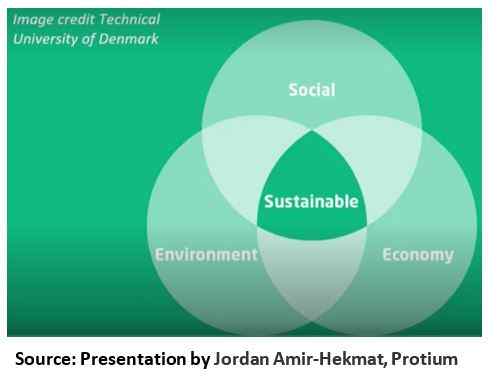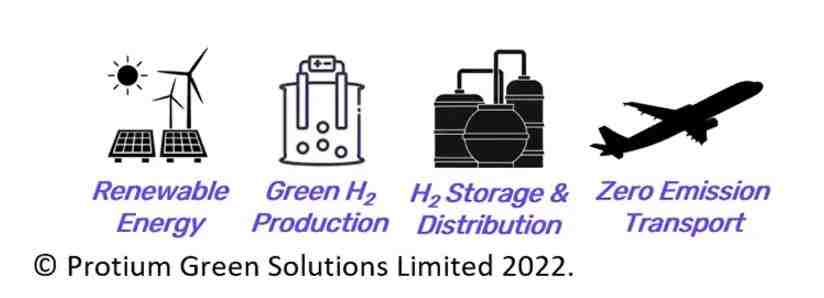

The online annual ARC Industry Forum Asia, titled Accelerating Industrial Digital Transformation and Sustainability on July 12-14, 2022, saw registrations of 1,600+ delegates for the two language tracks – Japanese and English. Siemens participated as a Global Sponsor and invited their partner Protium to make a presentation in the session on Sustainability Initiatives.
Protium is a full value chain green hydrogen energy solutions provider. The company develops, owns and operates green hydrogen infrastructure to deliver dedicated zero emission energy services to its customers. Jordan Amir-Hekmat, Assistant Project Manager for Protium, spoke about zero emission flight using digital twin technology to accelerate innovation. Joining him later in the panel discussion was Jorge Aguerrevere, Director, Electrochemical Cells and Reactors Practice for Siemens Process Systems Engineering. This blog captures the salient points of the presentation and Jorge’s responses during the panel discussion. The presentation video and panel discussion will be available on the vfairs platform till August 13th: ARC Asia Forum 2022 (arcweb.com). After August 13th you can watch the presentation video here.
Jordan has been leading the collaboration between Protium and Siemens PSE to optimize rapid hydrogen refuelling using digital twin technology. The key driver of Protium’s work is to tackle the global existential threat of climate change, and we need to urgently transition to a net zero economy. Net zero carbon emissions by 2050 was part of the Paris Agreement; and the UK has set its own domestic targets as part of the international decarbonization effort. The pandemic provided a unique opportunity to move away from fossil fuels and to create a sustainable, circular economy. This transition will require modern solutions and technological innovations.
Sustainability is more than just being environmentally friendly – it is a combination of environmental, social, and economic  factors. Protium needs to integrate all these elements into their offering to give communities around the world the opportunity to progress, and to provide them with the security to maintain their success. Zero emission aviation will boost economic growth in a globalized world, creating a positive cycle of sustainable development. Protium aims to achieve this by using green energy to displace fossil fuels.
factors. Protium needs to integrate all these elements into their offering to give communities around the world the opportunity to progress, and to provide them with the security to maintain their success. Zero emission aviation will boost economic growth in a globalized world, creating a positive cycle of sustainable development. Protium aims to achieve this by using green energy to displace fossil fuels.
Green hydrogen is produced by splitting water into hydrogen and oxygen using renewable electricity. Protium enables industries and the local government to reach zero greenhouse gas emissions, while unlocking the hydrogen economy and creating long-term skilled jobs. Heavy transport, including aviation, is one of the hardest sectors to decarbonize. Therefore, hydrogen is essential for replacing fossil fuels and for transitioning to net zero. Protium has several projects in the aviation sector to demonstrate this.
Challenges of Decarbonizing the Aviation Sector:
To address these challenges, Protium collaborated with Siemens PSE to develop fast refuelling innovation for aviation, to achieve fast turnaround times, and to improve the commercial case for hydrogen aviation and its viability as a green alternative. Siemens PSE’s digital technology expedited the design process to understand the constraints and optimize the solution. This would then be used to support the development of regulatory framework to establish a standard approach to rapid refuelling. Financial support was received from The Connected Places Catapult, through TRIG’s (Transport Research and Innovation Grants) zero emission flight program, which is funded by the UK Department for Transport (DfT).
Next, Jordan spoke about the project parameters and the cost benefit of improving performance. The highlight was the Cascade refuelling system that involves compression of hydrogen into multiple buffer tanks. Correctly sizing cascade storage tanks and the compressor is critical to meet peak demand and recharge time, as well as maximizing hydrogen utilization.

Digital twins are a virtual representation of a real-world system or process and are being used to model car engines, supply chains, entire cities, and even nationwide monitoring. Such models provide insights into real-life processes that would otherwise be highly time and labor intensive. The benefits of this technology are:
These benefits lead to extended lifetime, improved efficiency, reduced operation costs, and operational excellence.
Speaking about the digital design process, Jordan said that Protium and Siemens PSE’s combined hydrogen expertise with gPROMS software and powerful modelling, created a high-fidelity model to quickly design, assess, analyze and improve the system without physical prototyping. This saves time, resources, and long-term development costs. The approach itself was innovative and the design evolved over a period of several months from a simple refuelling event to more complex systems. The models provide detailed analysis in different scenarios to enhance performance. All this was explained via a video. The aim is to integrate this model with other digital technologies and with additional features provided by Siemens PSE. In future, the refuelling systems will be operated with the digital twins and monitor the performance.
After the informative presentation, Jorge Aguerrevere of Siemens PSE participated in the panel discussion.
Responses by Jorge of Siemens PSE at the panel discussion.
Sustainability turning into business opportunity and new sources of revenue: Sustainability initiatives have seen an uptick, but that’s more to do with the ambitious nature of the targets that are driving business, said Jorge. There is a lot of interest in digital technologies, particularly to address the challenges of this new type of process design where there’s a lot more uncertainty in what energy is available and how it’s integrated into the processes and energy markets that they are delivering to; and those uncertainties must be kept in mind when designing processes to make them more flexible.
Accelerated interest in digital twins: There’s certainly been a big increase in digital twins, especially on two fronts: well-established processes that have been in operation to improve efficiency; and in the green hydrogen sector there’s a new idea that the digital twin itself can go through the concept and design phases and evolve with the asset so that you can get the benefit of digital technology. Having this high-fidelity model with reliable and validated information that evolves alongside the asset is a huge advantage.
Using gPROMS technology at Protium: One of the biggest drivers behind using gPROMS technology at Protium at the design phase is that there is a digital applications platform available that can be used to communicate directly with an operating plan.

